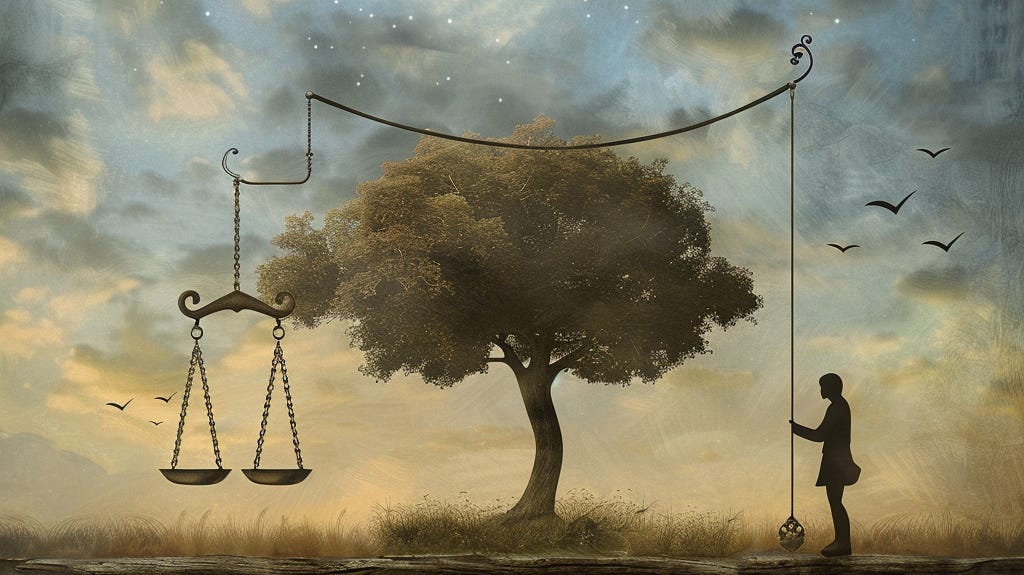Striking a better balance between rights & responsibilities
Are we overlooking an essential part of meaningful lives & societal cohesion?
Our world is increasingly preoccupied with the assertion of rights, but the corresponding conversation about responsibilities frequently seems relegated to the background, almost as an afterthought. However, it's within this neglected discourse that an essential component of meaningful living and societal cohesion lies.
Why is the foundational importance of responsibility, and its integral role in crafting a purposeful existence and robust communities so silent in our broader dialogue?
The Balance of Rights and Responsibilities
In contemporary society the emphasis on individual and group rights, particularly through mainstream and ‘social’ media, has never been more pronounced. We simultaneously amplify calls for equality while finding ever more ways to group ourselves more diversely.
While the protection and recognition of appropriate rights are undeniably crucial for the freedom and dignity of individuals, this focus has unwittingly overshadowed the equally significant concept of responsibility.
Rights and responsibilities are two sides of the same coin; you cannot have one without the inherent existence of the other. Rights bestow the liberty of choice upon us, while responsibilities guide those choices towards the enrichment of our lives, community, and society.
The New Zealand Perspective
From a New Zealand standpoint, this dialogue assumes a unique cultural dimension when viewed through the lens of 'whanaungatanga,' a Māori concept embodying relationships, kinship, and a sense of collective responsibility. This perspective emphasises that our well-being is deeply interconnected with the well-being of our family (whānau) and community.
In this context, responsibility is not just a personal endeavor but a communal pact to uphold the welfare and harmony of the collective. It's a testament to the idea that our individual purposes are inextricably linked to the larger purpose of our community's and society’s health and vitality.
From a systems-thinking perspective, it speaks to the fact that regardless of where we sit in the political and ideological spectrums, we all exist within a wider set of social systems whether we like or not. The healthier these systems, the better off we all are - and we all have a part to play in that being a reality.
The risk of greater focus on rights over responsibility
There are cultural and societal implications of forgetting our duties. The erosion of focus on responsibility in favor of rights without constraint can lead to further fragmentation in society. We risk further fragmentation when our social or political ideologies conflict in the pursuit of rights and liberty over the ‘common good’, or the ‘common good’ at the expense of the rights and liberty of others.
Jordan Peterson can be a polarising figure, but a point he frequently underscores regarding the significance of bearing one's load as a pathway to meaning dovetails well here. For Peterson, life is inherently fraught with suffering, and it's through voluntarily shouldering the burden of responsibility, be it personal, familial, or communal - that one finds a deeper sense of purpose and fulfillment. He advocates for a life lived in truth, where acknowledging and embracing our duties forms the cornerstone of character development and societal contribution.
Imagine if we all embraced that sense of individual and shared duty just a little more, and the collective impact that could have?
The Crucible of Purpose
At the heart of this intersection between rights and responsibility we find the concept of purpose. In a world increasingly defined by ‘which side you’re on’, the quest for genuine individual purpose has never been more pertinent. Responsibility, in its myriad forms, offers a path to this sense of purpose.
By taking responsibility for ourselves, we set the foundation for personal growth and resilience. Extending this responsibility to our family strengthens bonds and fosters an environment of support and nurture. Beyond the confines of our immediate relations, assuming responsibility for our community cultivates a sense of belonging and contributes to the creation of a supportive, vibrant societal fabric.
Where to from here?
While the clamor for rights is a testament to our desire for liberty and self-expression, a society that champions rights without the balancing force of responsibility risks fostering a culture of entitlement, division, tension, isolation, and ironically, inequality.
The New Zealand context, our tested and strained but enduring emphasis on community and kinship, serves as a poignant reminder of the strength found in collective responsibility. In whatever form it might take, embracing responsibility is not merely a duty but a privilege that lends depth and meaning to our existence. In the balanced interplay of rights and responsibilities, we can find the blueprint for a society marked by resilience, purpose, and interconnectedness.
It therefore falls to each of us, regardless of our political or ideological leanings, to consider more closely how we each can embrace, champion and value responsibility as means to reinforce the stability and satisfaction found not only in our individual, but collective lives.
As always, stay curious.


